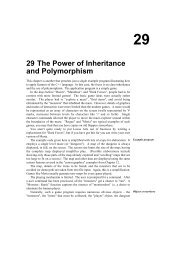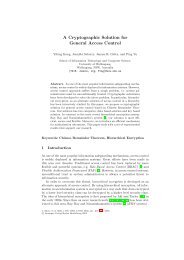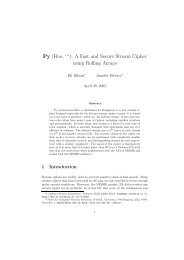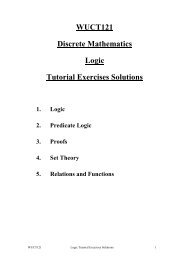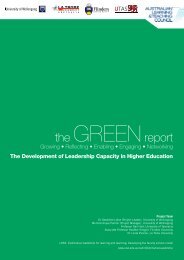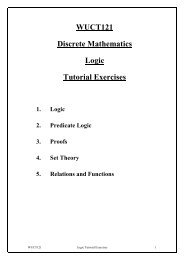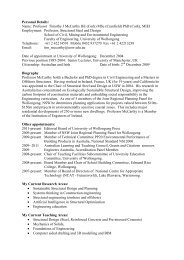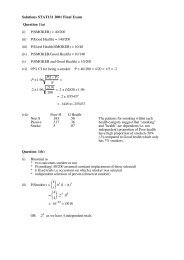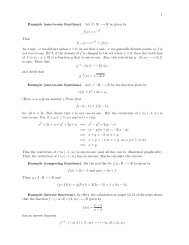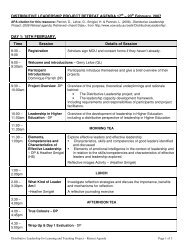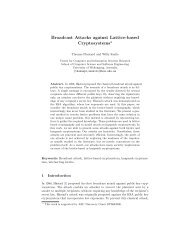india author m 1- a-nan - University of Wollongong
india author m 1- a-nan - University of Wollongong
india author m 1- a-nan - University of Wollongong
Create successful ePaper yourself
Turn your PDF publications into a flip-book with our unique Google optimized e-Paper software.
VARMA, P.N. "A Note on the Novels <strong>of</strong> R. Prawer Jhabvala" RUSEng 5 (1971):87-96.<br />
WILLIAMS, HAYDN M. "Mad Seekers, Doomed Lovers and Cemeteries in India: On R.P.<br />
Jhabvala's Heat and Dust and A New Dominion" New Literature Review 15 (1988):11-20.<br />
WILLIAMS, HAYDN MOORE. "R.K. Narayan and R. Prawer Jhabvala: Two Interpreters<br />
<strong>of</strong> Modern India" Literature East and West 16.4 (April 1975):1136-54.<br />
WILLIAMS, HAYDN. "Reactions to Entrapment in 'Backward Places' V.S. Naipaul's<br />
Miguel Street and Ruth Jhabvala's A BAckward Place." In A Sense <strong>of</strong> Place in the New<br />
Literatures in English edited by Peggy Nightingale, 68-84. St Lucia: U Queensland, 1986<br />
"Colonial history does not make for stability <strong>of</strong> residence." Comparision <strong>of</strong> two emigré<br />
writers, Naipaul 'returning' to his birthplace, Jhabvala 'adopting' a new country but depicting<br />
displaced characters seeking return to some elusive 'home'. Miguel Street can be read as a<br />
Joycean bildungsroman <strong>of</strong> escape (death and birth) and change (war and decolonization), a<br />
comic treatment <strong>of</strong> madness and violence not unlike Under Milkwood in which Hat serves as<br />
a Christ-like liberator for the disillusioned boy-writer. Jhabvala's figures escape to<br />
responsibilities (Judy and Sudhir) or remain trapped in a sterile retreat from life (Etta and<br />
Clarissa). The three women are seen as aspects <strong>of</strong> Jhabvala herself. Naipaul also charts the<br />
shift from colourful squalor to shabby trap, though Jhabvala remains ironic about her<br />
'backward place'. Text-based argument, with recourse to autobiographical works by both<br />
writers. [From ‘Full Anotations: Assesses both works as preoccupied with exile and the<br />
psychological connections to images and perceptions <strong>of</strong> 'home'. Claims these fictions meet in<br />
a common theme <strong>of</strong> escape. Perceives textual meaning generated by the <strong>author</strong>s' focus on<br />
psychological self-reflexivity.]<br />
WILLIAMS, HAYDN MOORE. "Strangers in a Backward Place: Modern India in the<br />
Fiction <strong>of</strong> Ruth Prawer Jhabvala" The Journal <strong>of</strong> Commonwealth Literature 6.1 (1971):53-64.<br />
Investigates Jhabvala's early fictions within the context <strong>of</strong> the Hindu concept <strong>of</strong> the<br />
four ashramas. Attempts to place the major characters <strong>of</strong> 'Get Ready for Battle', 'The Nature<br />
<strong>of</strong> Passion', 'The Householder', 'A Backward Place', within a particular phase <strong>of</strong> the<br />
ashramas. Brahminical moral evaluation serves as the testing material in the background <strong>of</strong><br />
Jhabvala's realistic portrayals <strong>of</strong> the complexity and universality <strong>of</strong> the Indian urban family<br />
situation.<br />
WILLIAMS, HAYDN MOORE. The Fiction <strong>of</strong> Ruth Prawer Jhabvala Calcutta: Writers'<br />
Workshop, 1973.<br />
WINEGARTEN, RENEE. "Ruth Prawer Jhabvala: A Jewish Passage to India" Midstream<br />
(March 1974):72-9.<br />
Reiterates previous treatments <strong>of</strong> A<strong>nan</strong>d's work as dominated by concern for the poor<br />
and underprivileged trapped by India's class and caste systems. Closely examines the<br />
character <strong>of</strong> A<strong>nan</strong>ta and finds him a victim <strong>of</strong> rage and insanity, not <strong>of</strong> religious or political<br />
creed, and his sacrifice is that <strong>of</strong> the unselfish man for humanity. Sociological analysis based on<br />
economic determinism as fundamental principle in a capitalist society.<br />
See also Kakatiya Journal <strong>of</strong> English Studues Vol. 11 No. 1 Spring 1977:85-92.<br />
WINTERBERG, INGE. "'An Experience <strong>of</strong> India': Zu den IndienRomanen von Ruth Prawer<br />
Jhabvala" Arcadia 17.2 (1982):171-94.




